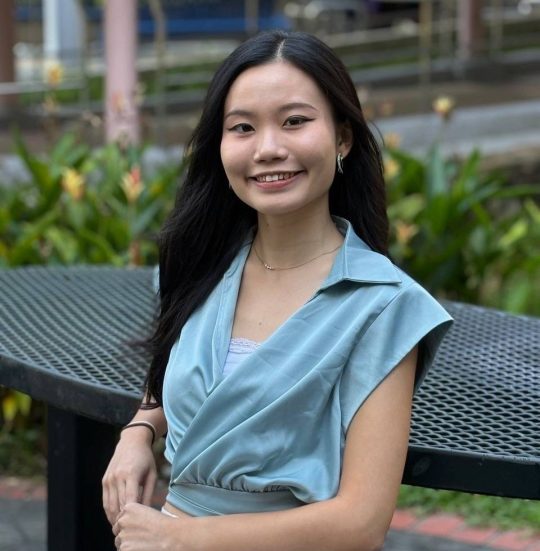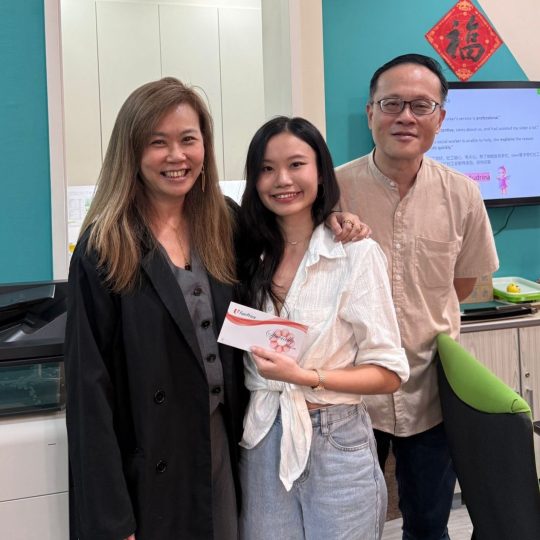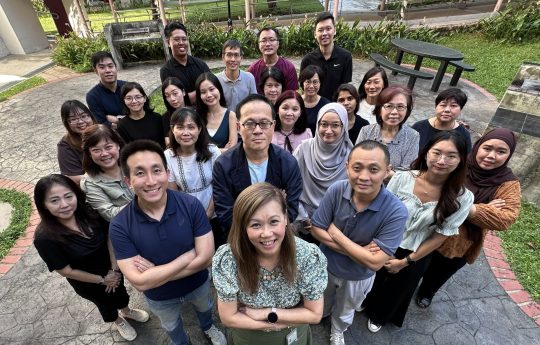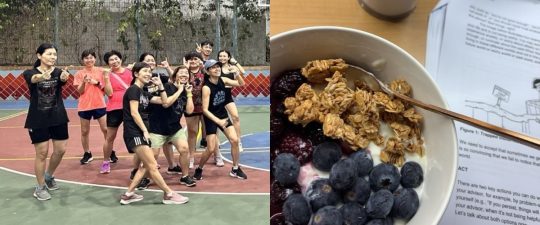This World Mental Health Day, we spoke with Audrina Tan, an Associate Psychologist at NTUC Health Community Social Services (CSS) about her work with the Community Resource Engagement & Support Team (CREST) to provide accessible mental health services for seniors, families and caregivers.
Mental Health Support in Singapore
As Singapore transitions into a super-aged society, the demand for effective and personalised community care is increasingly critical, with growing emphasis on supporting senior’s physical health but also their mental well-being. Yet, delivering holistic support to seniors, their families, and caregivers within the community care sector remains a complex endeavour.

Audrina Tan, Associate Psychologist and
Case Manager at NTUC Health Community Social Services
“One of the biggest challenges [in community care] lies in the intersection of isolation, stigma and limited access to sustained psychological care” explained Audrina Tan, an Associate Psychologist with NTUC Health’s Community Social Services (CSS). From her work with the Community Resource Engagement & Support Team (CREST) which specialises in mental health services, Audrina notes the realities of community perceptions around mental health. With age, seniors are at risk of social isolation due to shrinking networks, mobility difficulties or bereavement, all of which may exacerbate the risk of loneliness and depression.
Stigma and common misconceptions—such as mental health issues being seen as a “sign of weakness,” “a natural part of ageing”, or “untreatable”—are just some of the myths Audrina and the extended CREST team are determined to challenge. It is vital that seniors and the wider community recognise mental health as an integral part of overall well-being, deserving the same attention as physical health. Encouraging open dialogue about mental health is key to fostering comfort and receptiveness to support, whether for early intervention or ongoing psychological care.
Inside Audrina Tan’s Work with NTUC Health CSS
Audrina’s passion for community care is rooted in her desire to make a tangible impact on the lives of seniors and caregivers through mental health support, shaped by her academic background in Psychology and prior experience at NTUC Health headquarters. As a Singapore National Cooperative Federation scholar, she first joined NTUC Health as a Corporate Communications & Branding (CCB) Intern, supporting campaigns and events that deepened her appreciation of how each service contributes to a holistic continuum of care.

Audrina receiving a token of appreciation from her CSS Head and Team Lead for her outstanding service and the positive feedback she received from clients and caregivers in the satisfaction survey.
Her academic background in stigma reduction research, including two peer-reviewed journal publications, together with her practical community experience, has equipped her with critical insight into the emotional, psychological, and sociocultural challenges that often deter seniors from seeking care. These experiences inspired her move to the Community Social Services (CSS) department, where she is dedicated to advancing mental health and addressing stigma through culturally sensitive interventions. For Audrina, working with seniors in the community is deeply grounding; it reminds her of the resilience of the human spirit and the central role of empathy in care.
Clients often teach me about life through their stories of hardship, love, and survival. To me, the most rewarding part of this work is not only supporting them through their struggles, but also journeying with them as they rediscover dignity, meaning, and hope.
Audrina Tan
Associate Psychologist CSS
Audrina works closely with two complementary teams, Community Case Management Services (CCMS) and CREST, both focused on proactive, personalised support for seniors and caregivers. Funded by CCMS, she supports ongoing case management through home visits, family engagement, and collaboration with community partners, while monitoring progress using validated outcome measures and behavioural observations. By providing psychological input in consultations, Audrina helps the wider team look beyond surface behaviours to understand underlying factors behind clients’ challenges, allowing for more effective interventions.

Audrina with the CCMS team, where she works to provide proactive and personalised support for seniors and caregivers.
Within CREST, she also contributes to developing clinical interventions and consultations, provides psychoeducation, and conducts community outreach to identify individuals and caregivers who may be experiencing early signs of mental health challenges. Because CREST staff are embedded within the community, they are approachable and able to respond quickly, by providing timely support without the fear or stigma associated with clinical settings. Her contributions across CREST and CCMS reflect a client-centered approach that meets the needs of clients and caregivers, ensuring they are supported throughout every stage of their care journey.
“One of my earlier cases was with a client diagnosed with Major Depressive Disorder. He often cried himself to sleep, questioning the point of life and ruminating on painful past experiences,” Audrina shared. Rather than accepting others’ labels of him as a ‘moody’, she approached each session without judgment, trying different strategies to best support him. Using narrative therapy, she invited him to share and reframe his life experiences, helping him see his resilience and strengths. Through many sessions of rapport building and therapy interventions, he began to engage with others, and even share jokes during sessions—a notable shift from his initial hopelessness and refusal to engage.

Reenactment of Audrina providing support for her client through therapy sessions.
Audrina also used visual tools to help him understand how thoughts, feelings, and behaviours influence one another, and worked with him to practise strategies that interrupted negative thought patterns. Over time, other service providers noticed the change, he was more engaged with services, responded more warmly to others, and demonstrated greater awareness of available support. In a client satisfaction survey, he shared: “很满意,会推荐给朋友,辅导员很细心,服务很好,很照顾我,如果我不明白,她会解释给我听.” (“Very satisfied, I would recommend this to my friends. The counsellor is very attentive, the service is very good, she cares for me, and if I don’t understand something, she explains it to me.”)
Balancing Work and Wellbeing
Working in community mental health can be deeply rewarding yet emotionally demanding. To maintain her own wellbeing and prevent burnout, Audrina has built routines that nurture both body and mind while fostering social connection.

Audrina fostering friendships through fitness and preparing her favourite meal to care for her personal wellbeing.
She attends community exercise classes like Salsation, Zumba, and steel combat after work, often alongside seniors in her local community. She was struck by their energy and fitness, and over time, she and her partner formed friendships within these groups, finding support and connection through shared activities. These experiences, together with regular exercise, have become valuable acts of self-care that fuel and ground her, helping her stay resilient in both work and life.
Additionally, she also incorporates self-care into her mornings through light stretches, reading therapy materials, and preparing her favourite meals in advance. Together, these routines provide balance, clarity, and resilience—helping her stay grounded in both work and life.
World Mental Health Day 2025: Changing the Tide in Perceptions of Mental Health Care
Reflecting on World Mental Health Day 2025, it is clear that changing perceptions of mental health care in Singapore remains a key priority. Supporting a loved one with mental health challenges can be a challenging journey, but as Audrina highlights, compassion, patience, and non- judgmental attitude are essentials. Fostering open conversations and normalising struggles are equally important in building a community where help-seeking is encouraged, early intervention is possible, and no one has to face their challenges in isolation. Looking ahead, Audrina hopes to see a Singapore where mental health care is accessible and integrated seamlessly across community and institutional settings—including workplaces, schools, and military environments. She envisions a future where stigma is actively reduced through education, research-informed interventions, and community engagement, enabling preventative care and stronger societal support networks, and ensuring that mental health is recognised as an essential part of overall well-being.
Health is not only about living well day to day, but also about maintaining dignity and independence in later years. Mental health plays an essential role in ageing well.
Audrina Tan
Associate Psychologist CSS
Need Support for Your Mental Health?
Get in touch with NTUC Health's Community Resource Engagement and Support (CREST) team. CREST facilitates early detection of mental health issues and provides timely assistance and care coordination, ensuring seniors remain engaged and supported in their community.
For support and guidance, seniors and their caregivers can contact NTUC Health from Monday to Friday, 8.30am to 6pm, at 9455 2308 or email crest@ntuchealth.sg.


